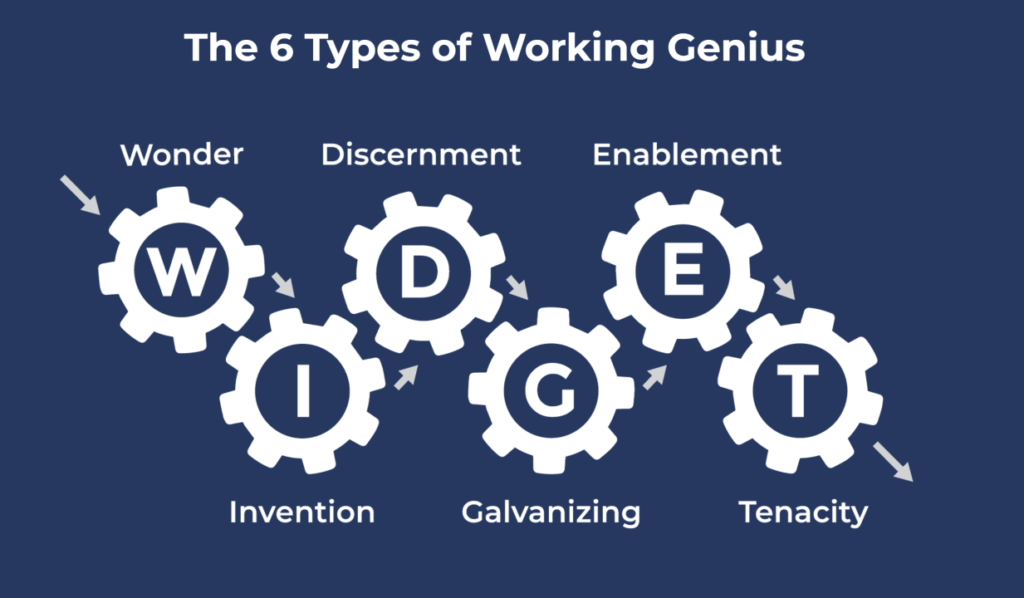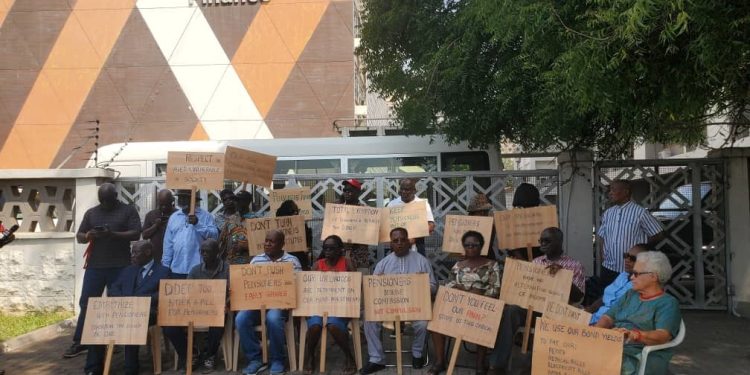
FROM PROFESSOR TO PICKETER: The Lost Generation and the Missing Money
Ghana is neither worth living for nor dying for. That’s how many feel at the moment. Honestly. Think about this: I’ve known Uncle Kweku since his graduate student days on the University of Ghana campus. I was only a lad then. He would later complete his graduate studies, an MPhil in linguistics, and top it up with a PhD from Oregon, USA.
After an illustrious career as an academic (see his brief bio here on the University of Ghana website) he not only retired as a full professor but even served as Pro Vice-Chancellor of Ghana’s premier university. What do we find the illustrious son of Ghana doing these days? Picketing on the premises of Ghana’s Ministry of Finance to demand that the government exempts his and fellow pensioners’ bonds from being sequestered in the dubious Domestic Debt Exchange (DDE) programme. I know for a fact that virtually all of Prof. Kweku Osam’s pension monies are in these bonds. Ei! A former Chief Justice also picketing alongside the other day is reported to have said, “I am over 70 years now. I am no longer government employed, my mouth has been unguarded, and I am talking, and I am saying that we have failed.”
“BACK TO THE FUTURE”
When Uncle Kweku overtly verbalized to the media in an interview on one of the picketing days that he would dissuade his children from ever investing in the Government of Ghana’s financial instruments because “they are risky,” he seemed to have read my mind. Seriously. For while I agree that it is despicable to draw the aged into this DDE debacle and punish pensioners who have planned well for their future and lent their own monies to government to work with, I have an even greater concern for the young people of the country who might take decades to recover from this rude shock. It has taken years to grow a savings and investment culture in Ghana.
As previously started in an earlier article on this matter, “I am pained that, ‘The fathers have eaten sour grapes, and the children’s teeth are set on edge’ (Ezekiel 18:2). For over 20 years now, The HuD Group and I have championed a culture of savings and investments in Ghana, and had the JOY of seeing thousands heeding the call, especially young people.” I recently met one of the young men I used to travel the country with to inspire and teach young people to form investment clubs and start investing. He’s currently the managing director of a major investment company in Ghana. He intimated how this whole DDE disaster made him shed several kilograms over a month, being at the receiving end of verbal and other forms of abuse from frustrated and fearful investors. At the time we spoke, people were withdrawing an average of 100 million Ghana Cedis each day from his outfit. He had already dispatched 2.5 billion Ghana Cedis when we held our conversation.
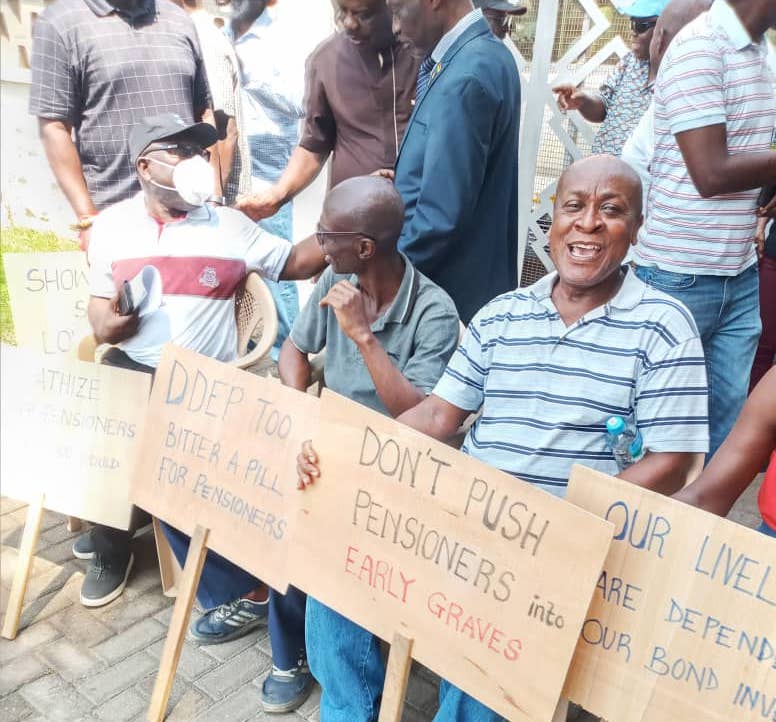
A zoom in on Prof. Kweku Osam, picketing at the Ministry of Finance, with his fellow pension bondholders
BACK TO THE PENSIONERS
So what exactly are we working for? The calibre of pensioners-turned-picketers is disheartening: doctors, engineers, civil servants… If retired professors and chief justices are protesting, what about the no-namers and the many who are too old or too ill to hit the streets? I am privy to a WhatsApp message Prof. Kweku Osam sent that was meant to be just informational, but ended up being very transformational for me:
The last time I took part in a public demonstration against a government of Ghana was in May 1983, as a fresh graduate student. That was when students in the country rose up against Rawlings and his PNDC. Today, God willing, I’ll join fellow Pensioner Bondholders to protest at the Ministry of Finance. The government should leave Pensioner Bondholders alone. Touch not the Pensioner Bondholders.
Think about it: Uncle Kweku began his working life protesting the government. Forty years later, he is ending his working life with yet another anti-government protest. Virtually all his lifesavings is now being held at ransom by a government that has misled and mismanaged her affairs, Covid-19 and Russia-Ukraine notwithstanding. After forty years of wandering in the wilderness between the 1983 protest and the present one on the eve of our sixty-sixth independence commemoration, Ghana itself is a pensioner by age, without much to show for it. We’ve got to do better for our people, old and young alike. Seriously.
Prof. Osam’s generation–my parents’ generation–is the same one the current Finance Minister, Uncle Ken, belongs to. It is the same crop of people who plotted military coup d’etats a generation ago in their youth. Now they won’t exit quietly either, not without a financial coup de grace. With trepidation, dare I call them the lost generation? And they did not only lose themselves and their way, they lost money–theirs and ours.
But to what will my generation and those following rise, having clearly observed that Ghana is not worth living for and Ghana is not worth dying for? That’s how many feel at the moment. Honestly. Think about it.

The Fathers’ Appetites Have Soured the Children’s Futures
The following slightly edited version of this article was first written and posted on Dr. Yaw Perbi’s FaceBook wall on January 31, 2023. At the time, that last day of January was the deadline to tender in eligible Government of Ghana bonds in the controversial Domestic Debt Exchange (DDE). There have been scores of passionate responses to the trending article that we have decided to reproduce it here so people are able to document these for posterity.
I am pained that, ‘The fathers have eaten sour grapes, and the children’s teeth are set on edge’ (Ezekiel 18:2). For over 20 years now, The HuD Group and I have championed a culture of savings and investments in Ghana, and had the JOY of seeing thousands heeding the call, especially young people. Financial Whizzdom, is what we called the campaign.
I wrote three personal finance books and executed a triple launch of Financial Whizzdom, Financial Whizzdom Nuggets (a summary) and Financial Whizzdom through Investment Clubs. It was around that time that Uncle Ken became a mentor to me. He was intrigued that a medical student would be so adept at the world of finance. He not only loaned us some money to finish the project (which we fully paid back within three months or so) but he also passionately spoke at the triple launch. The year was 2004.
Many like-minded people came together to push a savings and investments culture among young people. We traveled the length and breadth of Ghana, doing several seminars and workshops. Medics Investment Club (which really is the first investment club in Ghana per the National Association of Investment Clubs definition) became a model for many who also started their own investment clubs around the country, from university campuses and nursing training colleges to even secondary schools. No wonder I’ve been christened “the grandfather of investment clubs in Ghana.”
The many who wanted to join our investment club at the University of Ghana Medical School but who couldn’t (we had set the maximum for 20) were mobilized into a collective investment scheme we called ‘Mutual Medics.’ At the peak we grew to about 300. We sacrificed student loans, ice cream money and even extra-curricular fun and entertainment to save for our future. Almost none of us have withdrawn the monies we invested almost two decades ago.
Today, January 31, 2023, is the deadline for the trustees of this mutual investment scheme we set up way back in our medical school days to inform Databank for sure whether or not to tender in our eligible bonds in the Government of Ghana’s Domestic Debt Exchange (DDE) debacle. Our fund managers had 70% of the total value of the fund in government bonds, which in normal times and normal places with normal people are supposed to be very low risk, even tempting some advisors to say ‘no risk’ (nothing is ‘no risk,’ not even life itself!).
This DDE is supposed to be a voluntary move but in reality it is a case of “choose your poison.” If you drink this one you will die, if you drink the other one, you will surely die. I am pained for myself, colleagues, fund managers, and the whole investment fraternity in Ghana, especially the younger generation. How did we get here? Indeed, ‘The fathers have eaten sour grapes, and the children’s teeth are set on edge.’
Even more heart-wrenching is that if this should happen under any Finance Minister’s regime, not under the watch of the very mentor who, as far as I know, has spent his whole life building the very financial culture, structures and systems that seem to be now crumbling at his hitherto dextrous hands. The irony.
I am pained. Very much. Whoever has eaten our money, killed our dreams, buried our hope and compelled us to come for unfashionable haircuts that make us look like our misery will have to make it up to us, somehow, even if it is their children or their children’s children. In the mean time, ‘The fathers have eaten sour grapes, and the children’s teeth are set on edge.’ Ah!
~By Dr. Yaw Perbi
Photo credit: Opinion Nigeria
Post Script
We shall do well to document as many of the responses we’ve garnered so far as possible. This issue warrants a national conversation, at the least. A national demonstration for all those equally pained might also be in order to send a strong message to the current government, who in spite of all the pain they are inflicting on the citizenry, have shown no significant sense of regret, repentance or even austerity.

On Saving a Nation.
The story is told of a man who traveled from a developing country to a more economically advanced one in search of a better life. Upon arrival, the man was shocked to find that no one managed the local milk shop. Customers would take what they needed from the refrigerator, leave the exact amount of money for their purchase, and be on their way. Neither the milk nor the money was under lock and key. This would never happen in my country, he thought.
The only thing that surprised the man more than the honor system of the unmanned milk dispensary was the price of the product. The milk was cheaper here, even though his country had more milking cows than people—and in turn produced more milk. How could this be? Then it finally hit him. The higher price at home included the additional costs of dishonesty and thievery.
In his country, locks would be purchased for the refrigerator and money box. A worker would be hired to conduct the transactions. Another person or two would be hired as security, in addition to needing expensive CCTV cameras. This is not to mention the added logistical and utility costs from inefficient or unreliable systems. It all adds up, reflected in the price of a single bottle of milk.
What the society of the man’s home country lacked in cultural values, it paid dearly in economic value—in other words, a higher cost of living than a country with a higher standard of living.
The commercial cost of values
What makes a nation great and strong, ultimately, is its people and their values. Societal values determine what people consider good or important, and this informs how they act. If we consider present-day Ghana in this context, we are likely to be disappointed.
Money and material possessions. Greed and selfishness. These values permeate our society. So I thought it wise to speak to the issue of values in terms of commercial costs. My hope is that even those who place money and materialism and personal gain above all else—including the common societal values espoused in our national anthem and pledge—will realize that real values, such as service and integrity, still affect their bottom line. They will make more money with them, than without.
Consider that Warren Buffet, one of the world’s richest men and most successful investors, advises leaders to look for three things when assessing job candidates: intelligence, initiative, and integrity—but to weigh integrity above all else. If a worker lacks the latter trait, Buffet says, “the first two will kill you. Because if you’re going to get someone without integrity, you want them lazy and dumb.”
It is with near-total trust that we poke an opaque tin of milk and pour out its content without a second thought. We’ve got to trust the regulator, trust the manufacturer, and trust the entire supply chain. A friend and former senior manager in a company that produces perishables once told me that the company would destroy whole batches of product at the slightest hint of compromised quality, because the negative cost of their brand being brought into disrepute would be much greater in the long run than the temporary loss of the thousands of dollars flushed down the drain by an honest act.
Values at the core of a nation
Little drops of values at the individual, family, organization, and sector levels of a society eventually coalesce to make a mighty nation. This is how I have long thought of Ghana. As a mighty nation, rich in social and cultural values to emulate.
I grew up in the early 1990s, when neighboring countries like Liberia and Sierra Leone were decimated by war. Hordes of refugees made their way into Ghana. As a World Vision Youth Ambassador, I toured refugee sites in the country with donors, and the tentative nature of life in tents made me tear up. I have always been grateful to God that Ghana in my life has been an island of peace in a sea of strife.
But bombs and bullets are not the only way to destroy a country. Rather than exploding in external violence, a society can implode through internal valuelessness. I fear Ghana is on this path. I see it all around. We have swung from one extreme to another in a few generations. My grandfather cared little about money or material possessions. He was not alone. How often can we say such things now?
Too often, money and materialism seem to the motivation for the world around us, even at the peril of our lives and at the cost of future generations. Look no further than the dastardly acts of inordinate illegal mining (galamsey), stinky corruption in politics and public service, brazen cheating in exams, rampant illegal practices which combine modern internet-based fraud with African traditionalist rituals (sakawa), food sellers using dirty (waste) water to cook, changing expiry dates on expired medicine or outrightly selling fake medicine… need I go on?
Building the Ghana we want, rooted in values that matter
I worry that in our hurry to catch up with the rest of the industrialized world, we are focusing on infrastructure, industry, and education without a values-based foundation. For instance, STEM education is being touted as the panacea for the challenges we face. But what use is STEM without roots? STEM or any other body of knowledge must grow from a deeply rooted network of shared social and cultural values and norms. Otherwise, patients needlessly die, shoddy infrastructure inadvertently collapses, common funds are looted, and justice is denied.
Ghana is at a crossroads, not just economically, but also culturally. There is a commercial cost to values that must be recognized and incorporated into the policies needed to set Ghana on a more prosperous economic course. Thankfully, influential Ghanaians are talking about it.
Earlier this year, the African Center for Economic Transformation (ACET), which is based in Accra and was founded by Dr. K.Y. Amoako, a Ghanaian, organized a retreat at at the Peduase Valley Resort for more than 50 people representing various civic and political stakeholder groups and organizations in Ghana. The topic of conversation was a new initiative that is set to launch officially in the coming days: the Compact for Ghana’s Political and Economic Transformation.
A roadmap for a stronger democracy and lasting economic prosperity, the Compact is a hopeful approach because it is rooted in strengthening our common values. I attended the Peduase Valley retreat, and values featured heavily in the discussion. It was stressed that the quest for Ghana’s economic and political transformation is meaningless unless it is underpinned by a radical shift in our mindset and values.
Indeed, the discussion focused on identifying values we can glean from the national anthem, the pledge, and the lyrics of “Yɛn Ara Asaase Ni,” written almost a century ago by Dr. Ephraim Amu, one of the fathers of our nation. From the conversation, values such as honesty, selflessness, hard work, and loyalty stood out.
Such discussions must continue in Ghana. Particularly, the all-binding value of integrity needs to be ingrained in every stratum and segment of our national life if we are to realize a greater Ghana, rooted in values that matter rather than tarnished by ones that do not.
Although less dramatic, a definite way to destroy Ghana without bombs or bullets is by eroding the very values that birthed the nation, slowly but surely. “Whether or not this nation prospers,” goes the resounding anthem from Dr. Amu, “clearly depends on the character of the citizens of the nation.”
Dr. Yaw Perbi has practiced medicine in both his home country, Ghana, and with the United Nations Operation in Cote d’Ivoire as a U.N. peacekeeper. He is the founder and Global CEO of The HuD Group, inspiring holistic emerging leadership development in 25 countries on all continents. He is co-founder of PerbiCubs, an edtech company impacting over 8,000 children in Ghana. Yaw is a Fellow of the Africa Leadership Initiative as well as the Aspen Global Leadership Network.
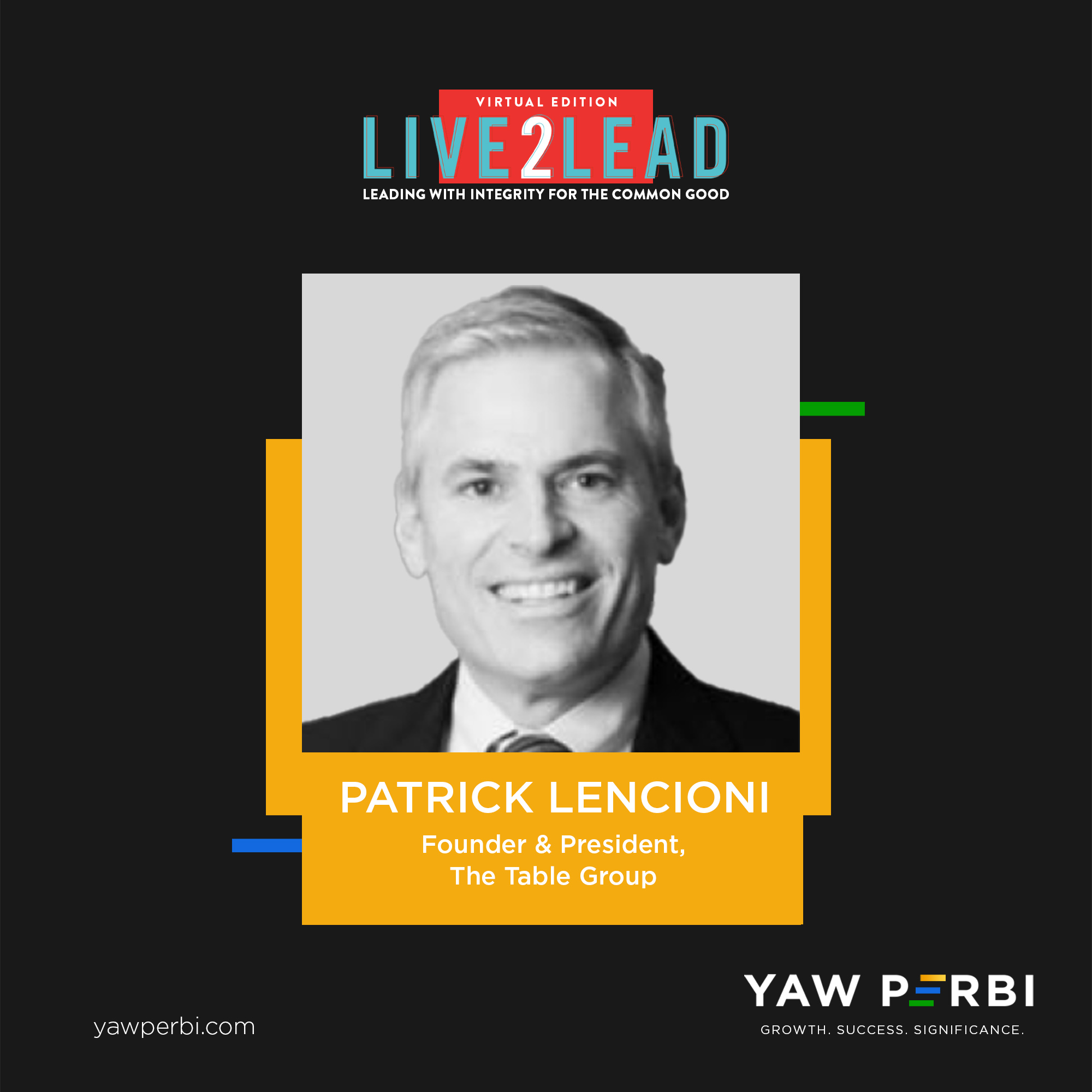
Meet Patrick Lencioni, the Workplace Guru.
There’s no one I enjoy hearing about teams, meetings and workplace dynamics like Patrick Lencioni. Patrick is an American author of books on business management, particularly in relation to team management. He is best known as the author of The Five Dysfunctions of a Team, a popular business fable that explores work team dynamics and offers solutions to help teams perform better. On a recent trip to southern and eastern Africa, his cautionary tale to CEOs published in a book by the title The Motive, was my jolting companion. It brought me back to my senses as CEO of a few enterprises.
Lencioni is Founder and President of The Table Group, a management consulting firm specializing in executive team development and organizational health. As a consultant and keynote speaker, he has worked with senior executives and executive teams in organizations ranging from Fortune 500s and high tech start-ups to universities and non-profits. He also gives talks on leadership, organizational change, teamwork and corporate culture. He is frequently interviewed for national media including features in the Wall Street Journal and USA Today.
SIX TYPES OF WORKING GENIUS
At the annual John Maxwell Live2Lead conference last week–the Ghana site hosted nearly 600 leaders LIVE! with thousands more to benefit through rebroadcasts–we heard from Patrick Lencioni about his groundbreaking new model that provides a deeper understanding into our workplace and team dynamics.
The six types of working geniuses together form the word WIDGET, symbolized by six gears working perfectly synergistically well together. W is the genius of Wonder, I the genius of Invention, D the genius of Discernment, G the genius of Galvanizing, E the genius of Enablement and T the genius of Tenacity. In the near future we shall provide a fuller blog delving into further details about these six geniuses. In the mean time hear Pat the sage, “If you want to be successful and fulfilled in your work, you must tap into your gifts. That can’t happen if you don’t know what those gifts are.”
THINGS DON’T HAVE TO BE THIS WAY
Pat explained how people don’t understand their personal areas of working genius, which impacts their ability to identify work opportunities that would be most meaningful to them, as well as disallowing organizations, teams, and families to help individuals tap into their true working genius, resulting in a failure to reach one’s true potential. But things don’t have to be this way. This tragedy is avoidable, as Pat shared how you can identify your working genius and understanding which one of the six geniuses both you and your teammates are. Contact us, the Live2Lead team, if you and your team would want to test your genius to become all you really could be. There are no dumb or lazy people on the planet or on your team; only geniuses who are yet to find and fire up what makes them tick!
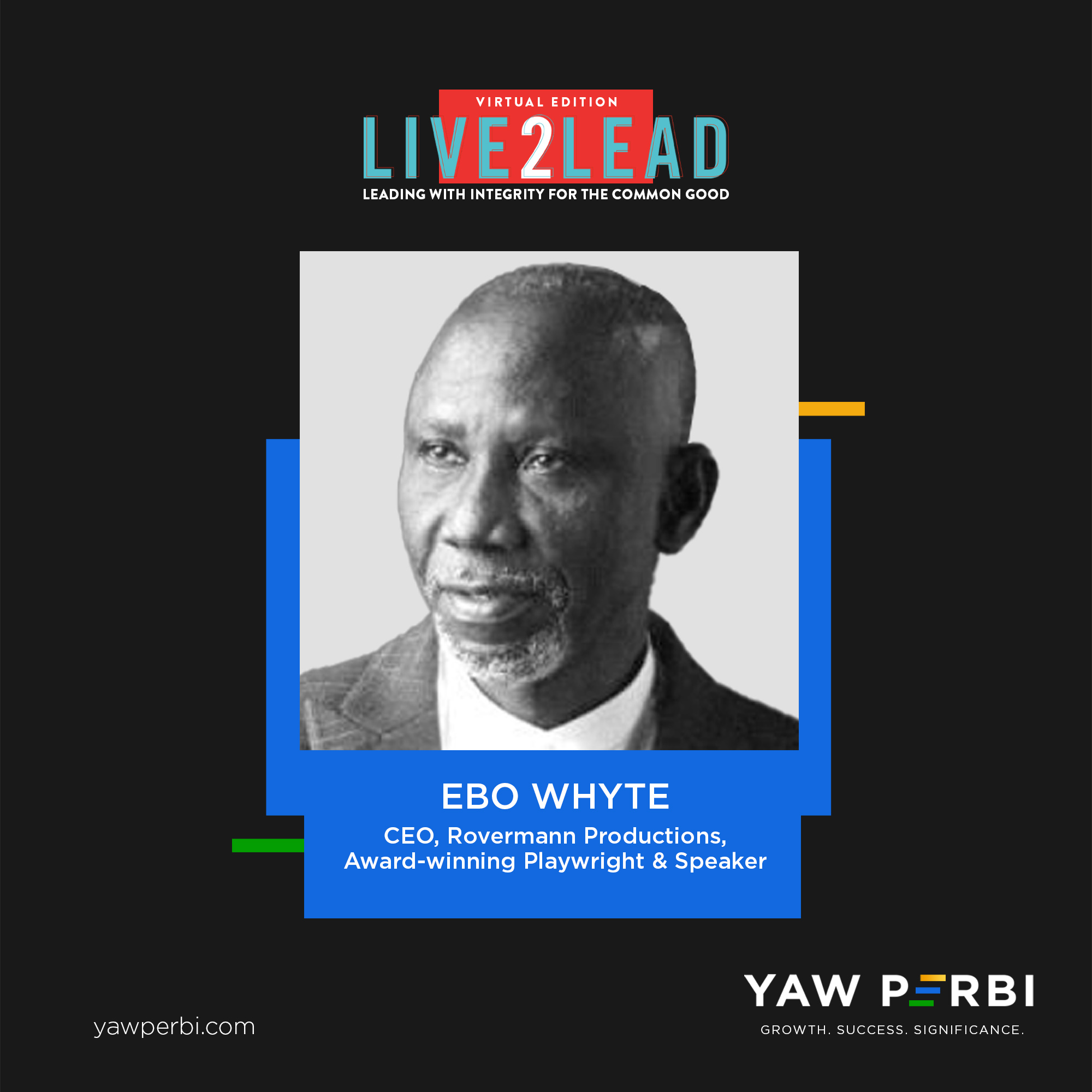
Meet Uncle Ebo, the People’s Uncle.
Everyone calls him “Uncle” without even thinking twice about it. Whether young enough to be their son or old enough to be their grandpa, “Uncle” is everyone’s uncle. A voice of reason, counsel in season, James Ebo Whyte, affectionately known nationwide as “Uncle Ebo” is the people’s uncle, hands down.
Mr. James Ebo Whyte is the CEO, heart and brain behind Roverman Productions. He is nationally acknowledged as an accomplished, award-winning playwright and highly sought-after motivational speaker. James Ebo Whyte constantly challenges Ghanaians to think more about the world they live in and the contribution they make to it. Just the day before the October 7, 2022 Live2Lead conference at which he was speaking, he unveiled to his drama troupe his 51st play in fourteen years! A hearty congratulations to the prolific playwright.
INTEGRITY IN THE ARTS & ENTERTAINMENT INDUSTRY
At Live2Lead 2022, Uncle Ebo was the only gentleman among three distinguished leading ladies from the corporate and entrepreneurship spaces as well as the public sector. Their first job was to respond to the submissions on “Leading with Integrity for the Common Good” made in the earlier hour by Patrick Awuah, founder and president of Ashesi University. Uncle Ebo held our attention as he raised issues of integrity in the arts & entertainment segment of Ghanaian society that he had with intentionality decided to counter, like giving kickbacks from corporate sponsorship. He uttered with conviction, “there are sponsorships we know we’ll never get for our plays because of this.” And he’s fine with it, as he knows that integrity comes at a cost.
One of the most amazing feats of Roverman Productions has been putting up a new play every quarter for the last decade-and-a-half and resolving to always start on time, also a matter of integrity. In fact, one of the participants at Live2Lead, a corporate governance expert, interjected that one reason she chooses to go and see Ebo Whyte’s plays is that she can guarantee they would commence on time. Again, Roverman has gone against the tide by ensuring pristine toilet facilities at their play venues and three levels of security at events to ensure patrons have a heavenly experience and leave with no bitter taste in their mouths. To the people’s uncle, excellence in these areas is a matter of integrity.
OF TEENAGE FOLLY AND GAMBLING
We intentionally wanted to leave the Live2Lead conferees on a note of hope, especially hope in Ghana, and Uncle Ebo did not disappoint. While admitting we have mega challenges in the nation he reminds us that we’ve not only been in worse times but also that in the annals of nation building globally, at 60 years Ghana is only a teenager. The national happenings that leave us in consternation are akin to teenage tantrums and this too shall pass. We do have quite a degree of national folly though, which we need to be cured of, he confesses.
Uncle Ebo’s belief in Ghana is so solid that his parting words were the following: “Whoever bets against Ghana will lose.” For a full buffet of this scintillating conversation look out for a recording of the hitherto livestreamed video (currently only available to paid participants) or invite Live2Lead to rebroadcast in your context (company, community, church etc). You don’t want to miss Live2Lead 2023 on October 6, next year, Deo volonte. Pinned on the first Friday of each October, National Leader Day after National Leader Day, building a leader at a time and one centre of excellence at a time, we shall surely get to the Ghana we want. And who knows? Perhaps sooner than other nations have.
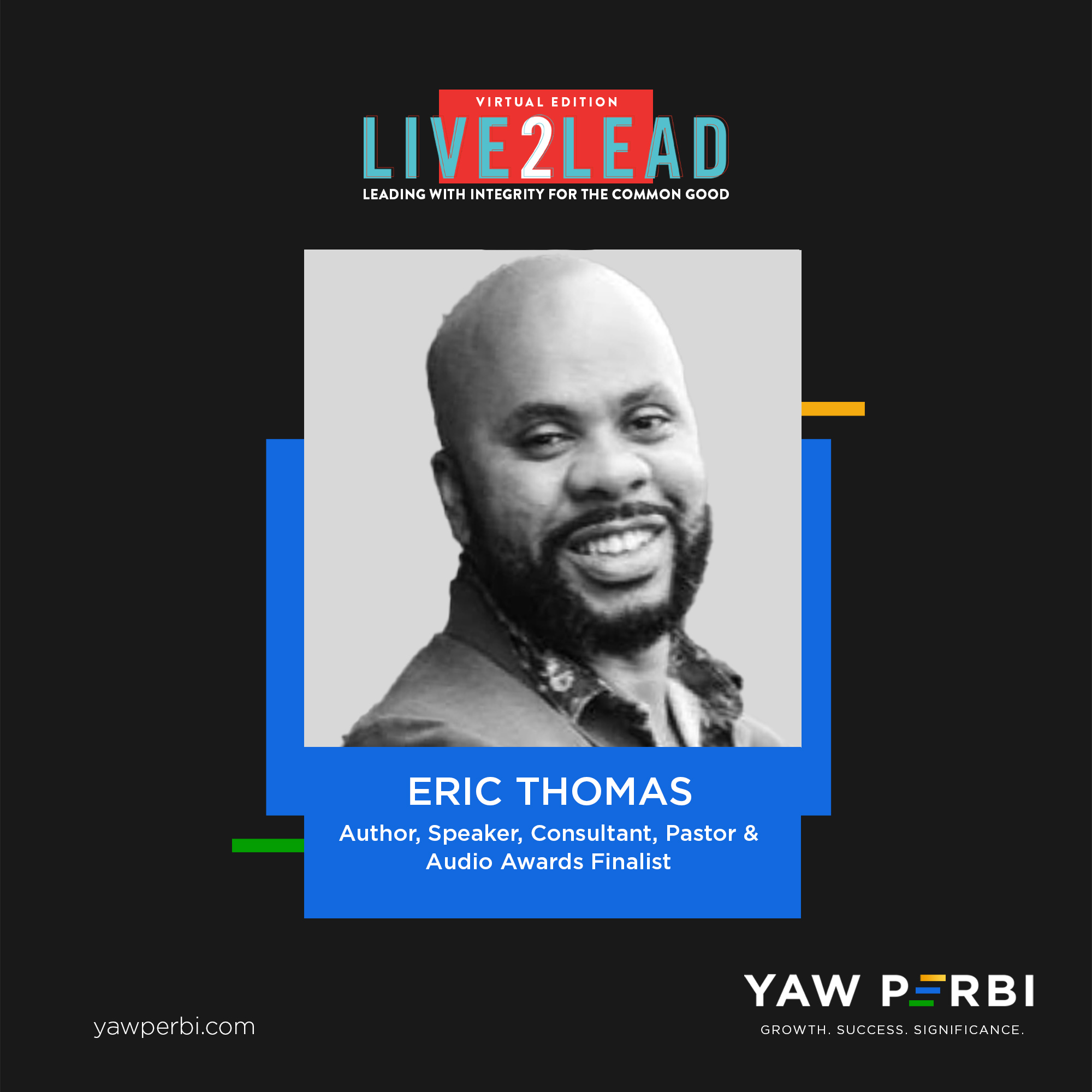
Meet Eric Thomas, a Fireball to Light a Fire Under You!
Eric Thomas, Ph.D., is a critically acclaimed author, world-renowned speaker, educator, pastor, and audible.com Audie Awards finalist. ET, as he is better known and affectionately called, has taken the world by storm, with his creative, common-sense approach to living a successful, satisfying professional and personal life. Through a significant social media presence and regular domestic and international tours, “ET, The Hip Hop Preacher” has become a global phenomenon!
As CEO of his Consulting Firm, ETA LLC., Dr. Eric Thomas has led his team through the doors of dozens of hugely successful organizations and Fortune 500 companies such as General Electric, Quicken Loans, AT&T, Nike, Under Armour, New Balance, and UPS and continues to consult for major league sports franchises within the MLB, NBA, NFL, MLS (various United States sports leagues).
YOU OWE YOU
That’s Eric’s philosophy of life, and his topic at Live2Lead on October 7: You Owe You: Ignite Your Power, Your Purpose, and Your Why. Come learn the key principles of how to turn a mentality of struggle into strength, resulting in enduring success. Eric Thomas shares his urgent message to stop waiting for inspiration to strike and take control of your life, using stories of his past and lessons learned as examples.
He will help identify how you can rewrite your life’s script and capture the attention of all kinds of people in a multitude of different environments. Sharing these critical first steps will help you with understanding yourself and the world around you, finding your why, accepting that you may have to give up something good for something great, and constantly stretching toward your potential.
Pump up your personal, professional and leadership game at this year’s Live2Lead conference. Register now through this link. Nag your organization until they join this rising movement of learning leaders that will transform society by becoming a Patron of Live2Lead. A Patron company is one that sends at least 10 leaders to Live2Lead, and this year they range from mining companies like Goldfields to banking greats like Stanchart. There’s no way we can have at least 100 such Patron organizations and companies in Ghana and not transform the nation, one leader at a time, one centre of excellence at a time. Together we can change our country and continent for the better! Let’s do this! Register here, and NOW.
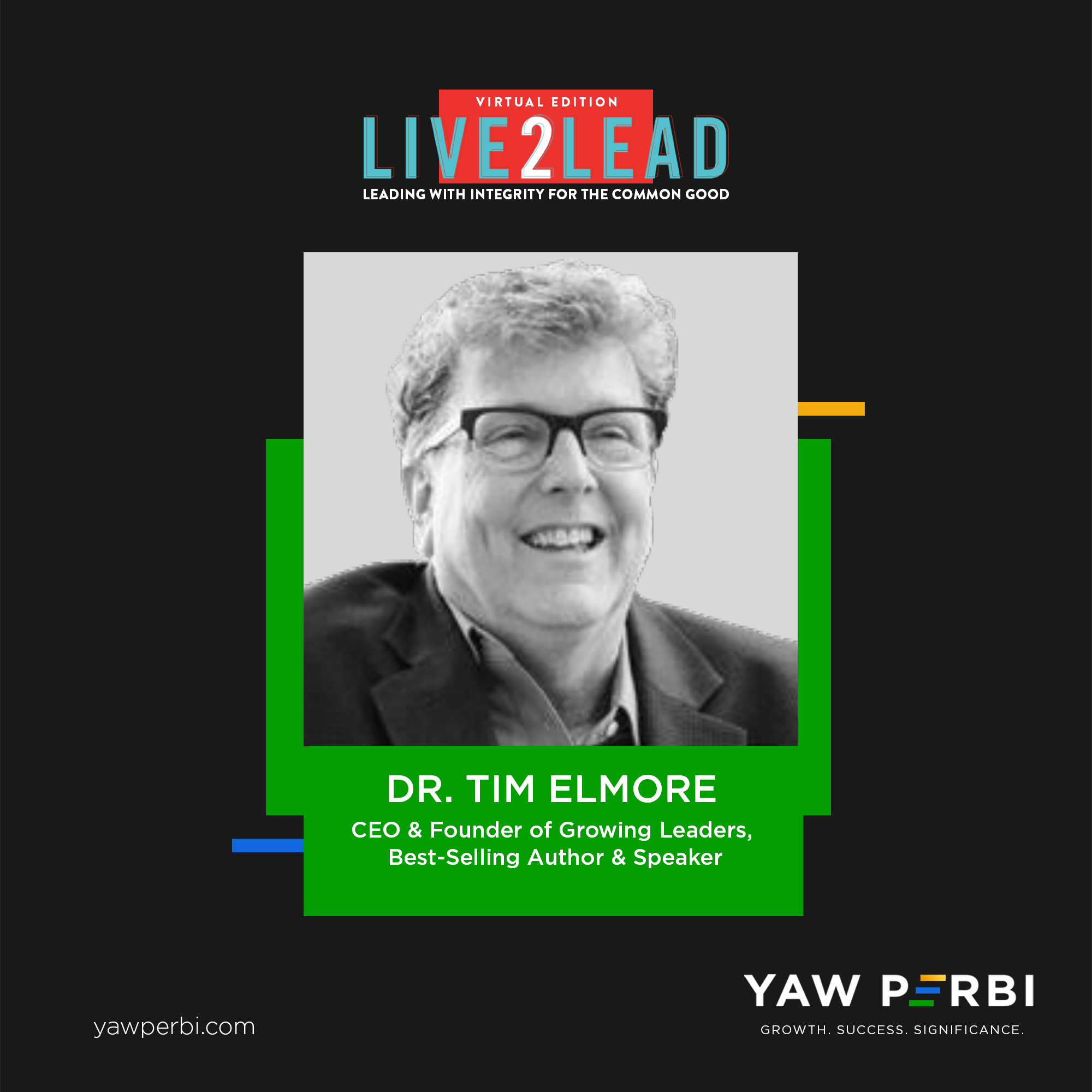
Meet Tim Elmore, Intergenerational Leader of Leaders.
Dr. Tim Elmore’s passion for leader development began in 1983 when he worked alongside and was mentored by best-selling author, Dr. John C. Maxwell. Since then, he’s emerged as an author, leadership expert, and keynote speaker who’s trained more than 500,000 leaders in hundreds of organizations worldwide. Speaking of intergenerational leadership, he’s also the Founder and CEO of Growing Leaders, a non-profit team that equips students and young professionals around the world to become life-giving leaders. Tim has developed young leaders on every continent and has spoken in 50 countries including India, Russia, China, Brazil and throughout the Middle East.
Dr. Elmore has advised corporations such as Chick-fil-A, Cox Communications, the Home Depot, Cici’s Pizza, Delta Global, Coca-Cola Consolidated, and more. He’s spoken at top-tier universities such as Stanford, Texas, Duke, Ohio State, Georgia Tech, U.C. Berkeley and more. And he’s presented to executives and world-class athletes with the Kansas City Royals, New York Giants, Houston Rockets, and San Francisco Giants. His blog is read by over 100,000 people weekly.
THE INTERGENERATIONAL WORKPLACE OF THE 21ST CENTURY
At Live2Lead on October 7, come hear how Tim brings his decades of research and leadership experience to bear on what might be the biggest, most dramatic, and most disruptive shift the workforce has ever seen: the vast diversity of several generations living—and working—together. Tim Elmore explores the fact that for the first time in history, up to five generations find themselves working alongside each other in a typical company. The result? There can be division. Interactions between people from different generations can resemble a cross-cultural relationship. Both usually possess different values and customs. At times, each generation is literally speaking a different language!
How can we hope to work together when we can’t even understand each other? Tim will provide the tools to:
- Get the most out of the strengths of each age group on your team.
- Foster effective communication instead of isolation among people.
- Build bridges rather than walls so that loneliness becomes connectedness.
- Connect people to learn how both veterans and rookies can mentor each other.
ADD VALUE TO YOU AND YOURS
At YAW PERBI Executive Leadership Education all our offerings are to the end that leaders grow personally, succeed professionally and become significant societally. Join Dr. Tim Elmore and the other stellar faculty Dr. John Maxwell has put together for this year’s Live2Lead conference and tune up your leadership game. Register now through this link. Impress upon your organization to join the movement that will transform society by becoming a Patron of Live2Lead. A Patron company or individual is one that sends at least 10 leaders to Live2Lead. Together we can change our world for the better!
Register HERE, NOW.

Meet Gwyneth Gyimah Addo, a Sight for Sore Eyes.
Gwyneth Gyimah Addo, often affectionately called Gwen, is a wife, mother, author, philanthropist, business leader, motivational speaker, marketing strategist and the CEO of Ghana’s leading human hair company, The Hair Senta.
After graduating from the University of Ghana, Gwen joined Standard Chartered Bank Ghana for six years. She holds an MBA in entrepreneurship and innovation from the China Europe International Business School (CEIBS) as well as an Executive Management qualification from Harvard Business School. Gwen was recently featured in a Forbes Africa interview on the global market boom of hair extensions and wigs. Her many awards include CEIBS Global Impact Award, CEIBS Most Promising Female Entrepreneur Award, and the 40 Under 40 Sales and Marketing Award.
Gwen founded the mega HIBS AFRICA global event to project the beauty industry on the continent and the Leading Senta Foundation which focuses on mentoring youth. Her first book, DIRECTION, is already creating impact in the lives of many young and adult readers. Her love, commitment, reliance and trust in the Lord is unquestionably the pivot around which her business success revolves.
WHAT YOU SEE IS WHAT YOU GET
It is hard not to like Gwen. She is absolutely winsome and authentic–what you see is what you get. This largely accounts for her over 100,000 following on Instagram, the social media platform on which she has virtually built her business. Finding high level leaders in Ghana who embody this year’s Live2Lead theme of “Leading with Integrity for the Common Good” has not been easy. Many crowd-pulling speakers did not seem to fit the bill, if we were going to be serious about walking the talk. It has been heartwarming to get to know Gwen personally, upon high recommendation from my network, and to find her a leader of integrity. The icing on the cake, for me, was to expressly read from her new book, DIRECTION, how integrity is a non-negotiable for her and the multi-million dollar business she heads.
On October 7 this year, Gwen will share her views on leadership and integrity and how she manages to remain authentic in a cut-throat society. Mrs. Gwyneth Gyimah Addo is a sight for sore eyes, literally and figuratively. Friends, we are going nowhere without integrity. For in the words of Zig Ziglar, “It is true that integrity alone won’t make you a leader, but without integrity you will never be one.”
Tune up your personal, professional and leadership game at this year’s Live2Lead conference. Register now through this link. Nag your organization until they join this rising movement of learning leaders that will transform society by becoming a Patron of Live2Lead. A Patron company or individual is one that sends at least 10 leaders to Live2Lead. There’s no way we can have at least 100 such Patron organizations and companies in Ghana and not transform it, one centre of excellence at a time. Together we can change our country and continent for the better! Let’s do this! Register here, NOW.
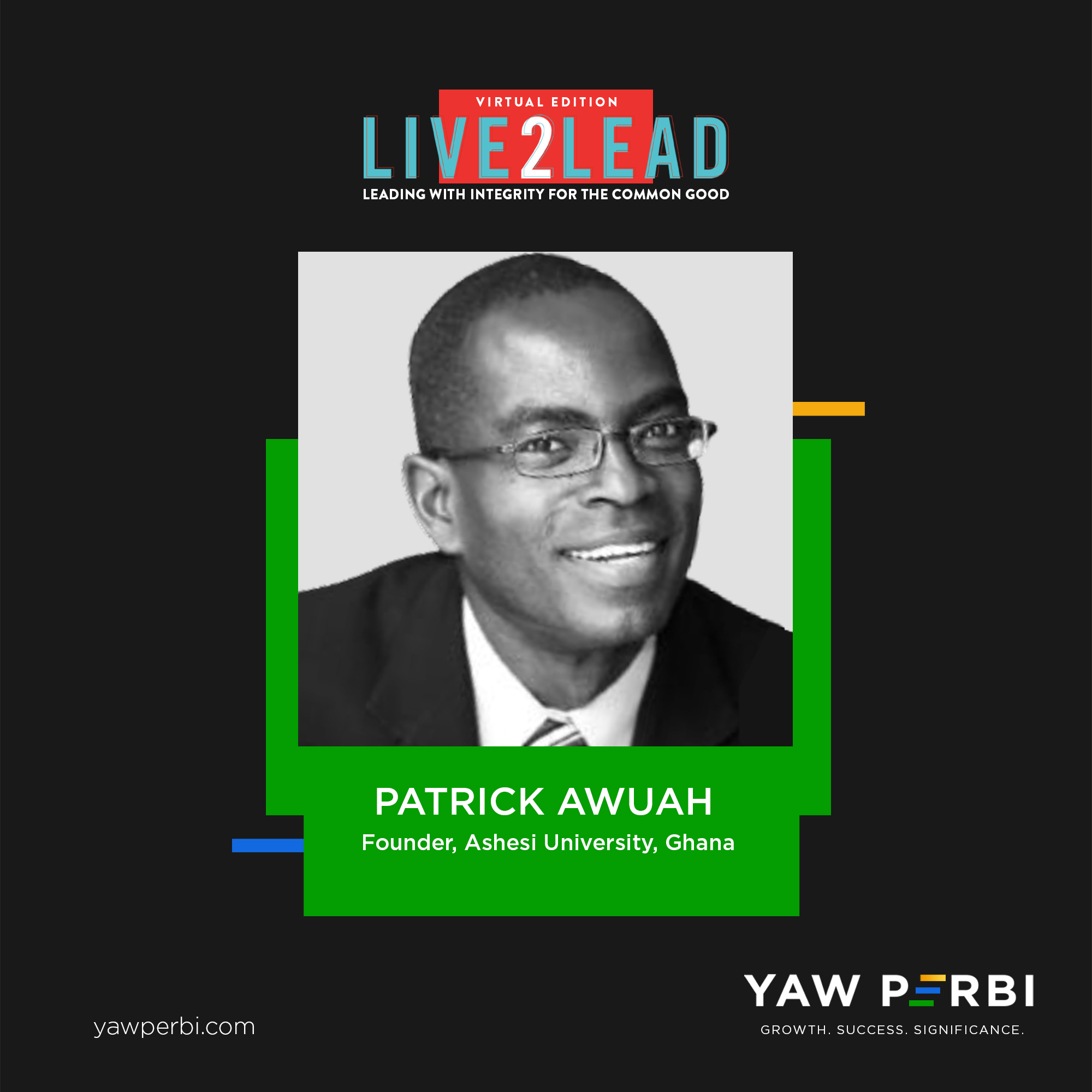
Meet Patrick Awuah, Trailblazer in International Education Brewed in an African Pot
Last Friday, I spent some time with friend, mentor and fellow African Leadership Initiative/Aspen Global Leadership Network Fellow, Patrick Awuah Jr. It was a joy to see and hear afresh his commitment to the cause of leadership development on the continent of Africa. And this personal pledge is to the extent that he will be excusing himself from a crucial Ashesi University board meeting to address the leaders virtually gathered at Live2Lead and then dive right back into the governance matters of this leading African establishment.
Patrick Awuah is a Ghanaian engineer, educator, and entrepreneur. Patrick founded Ashesi University in 2002. Dr. Awuah, with three honorary doctorates (Swarthmore College 2004, Babson College 2013, University of Waterloo 2018) to his name, has won numerous other awards as an individual and as the founder of Ashesi University. He was presented with the Order of the Volta Award to recognize his contribution to tertiary education in Ghana in 2007. In 2009, Awuah won the John P. McNulty Prize. In 2010, Awuah was awarded 87th most creative businessperson by Fast Company. In 2014, he received The Elise and Walter A. Haas International Award, which honours UC Berkeley alumni with distinguished records of service to their native country. In the same year, he was named best social entrepreneur by the Schwab Foundation for Social Entrepreneurship. In 2015, Awuah was listed by Fortune as number 40 in world’s 50 greatest leaders and was awarded a MacArthur Fellowship. In 2017, Awuah was awarded the World Innovation Summit for Education (WISE) prize, a major global education award.
INTEGRITY IN LEADERSHIP FOR THE COMMON GOOD
”INTEGRITY” is an often-used but little understood (and even less practiced) word in Ghana today. Patrick will be the keynote speaker on the theme for this year’s Live2Lead, “Leading with Integrity for the Common Good.” Ashesi has a fascinating story about an honour code and how its implementation nearly jeopardized Ashesi’s accreditation process. This tale has everything to do with instilling integrity, and for those of you who are not privy to the terrific tale, we shall be impressing upon Patrick to share “from the horse’s own mouth.”
Patrick will address what integrity actually means and share practical examples where he’s led with integrity and times his integrity has been challenged. Dr. Awuah will practically tip all and sundry on how integrity is taken off the wall and printed in hearts and minds on four levels: (1) personally (2) as teams (3) organisation-wide and (4) nationally.
You don’t want to miss Patrick Awuah’s fireside chat session at Live2Lead Ghana 2022. Grab your seat right here right now.
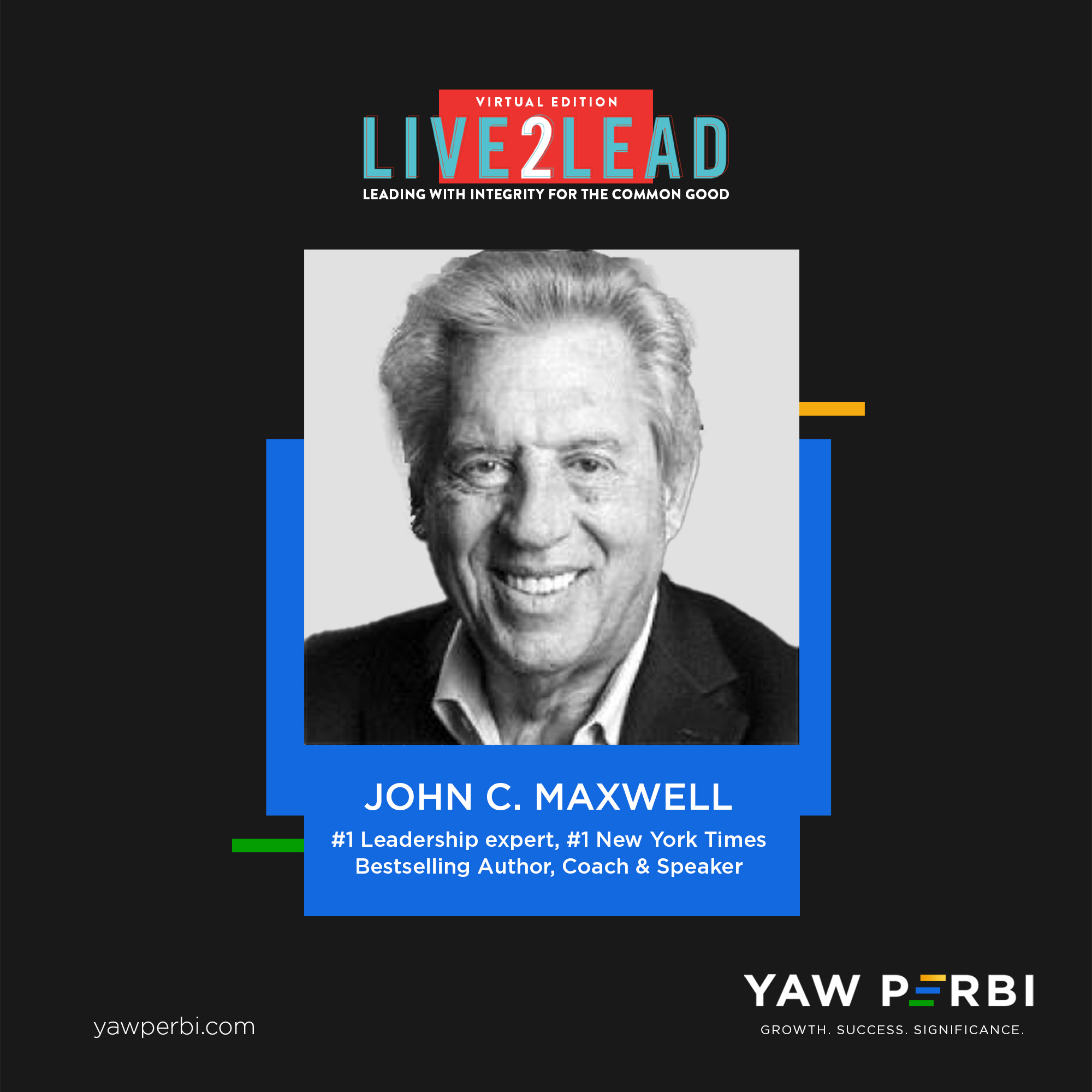
Meet John Maxwell, Mentor Emeritus
No single individual has influenced my leadership paradigm and praxis like Dr. John C. Maxwell. I started reading and understudying John in the late 1990s and have been teaching his materials ever since, both as a bonafide EQUIP trainer and a certified Maxwell coach/speaker/trainer on the John Maxwell Team (JMT).
Meet John Maxwell–my mentor emeritus–the #1 New York Times bestselling author, coach, and speaker who has sold more than 30 million books. John has been identified as the #1 leader in business by the American Management Association® and the world’s most influential leadership expert by Business Insider and Inc. magazines.
Dr. Maxwell has also received the Horatio Alger Award, as well as the Mother Teresa Prize for Global Peace and Leadership from the Luminary Leadership Network. His organizations—The John Maxwell Company, The John Maxwell Team, EQUIP, and the John Maxwell Leadership Foundation—have trained millions of leaders from every nation in the world.
The annual Live2Lead conference is John’s brainchild, and he always opens and closes, with other phenomenal faculty sandwiched in between. I have been privileged to host it on both sides of the Atlantic, in Montreal, Canada as well as Accra, Ghana.
LAWS OF COMMUNICATION AND LIMITS-BLOWING CONTENT
At Live2Lead this year, John C. Maxwell will be sharing new content from his upcoming book on the 16 Laws of Communication. Maxwell explains how to identify, grow, and apply your critical capacities. Once you’ve blow the “cap” of your capacities, you’ll find yourself more successful in your daily life.
We are absolutely convinced at YAW PERBI Executive Leadership Education that leadership (including communication) is taught; not just caught. Join John and the stellar faculty he’s put together for this year’s Live2Lead conference and up your leadership game. Register now through this link. Impress upon your organization to join the movement that will transform society by becoming a Patron of Live2Lead. A Patron company or individual is one that sends at least 10 leaders to Live2Lead. Together we can change our world for the better!
Register HERE, NOW.

